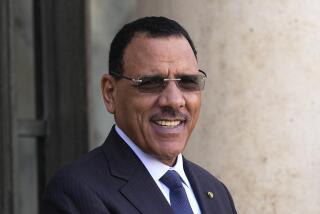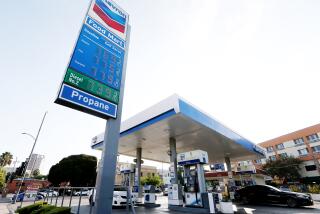Nigerian gas shortage resolved but new leader still faces major challenges
Nigeria’s gasoline scarcity was resolved Monday, but only after the shortages had damaged the economy, canceled or diverted commercial flights, shut down radio stations and put mobile phone networks at risk.
With incoming President Muhammadu Buhari set to be sworn in Friday, the opposition All Progressives Congress accused outgoing President Goodluck Jonathan of sabotaging the new administration.
Buhari faces high expectations and myriad problems, including a government financial crisis partly caused by the fall in oil prices, a battle against the militant group Boko Haram in the country’s northeast, electricity outages, widespread corruption and poor infrastructure.
In the final days of Jonathan’s term, the country has also faced dire gasoline shortages and millions in unpaid wages of government workers.
The gasoline shortage began before the March election that saw Jonathan lose his bid for reelection. However, it worsened recently when importers refused to distribute supplies, claiming the government owed them $1 billion in subsidy payments. Related unions, including tanker drivers, also went on strike, deepening the problem.
In Nigeria, the government keeps gasoline prices low for consumers by paying subsidies to companies that import and market fuel.
The Major Oil Marketers Assn. of Nigeria and distributors of gasoline agreed to resume deliveries Monday after a meeting at the nation’s Senate. The deliveries were expected to resume late in the day, but it could take days before the situation returns to normal.
Electricity shortages in Nigeria are common, but the gasoline shortages have meant that householders and businesses have not been able to run the home generators commonly used to power computers, home appliances, lights and other systems.
Hospitals, small businesses and bus companies were all hard-hit. Banks were forced to close early, domestic flights were canceled and international flights were diverted. Mobile phone networks warned over the weekend that their services would be impacted unless a solution was found because of a lack of diesel to run their systems.
The political opposition, which will take office with Buhari, says the government owes $60 billion in debt.
Nigeria is one of the continent’s biggest oil exporters, producing 2 million barrels of oil a day, but it lacks refineries and is forced to import most of its gasoline. Subsidies cost the government about $2.6 billion a year, but Jonathan’s attempt to remove the subsidy in 2012 triggered mass protests and he backed down.
At the time, the government argued most of the benefit of the subsidy went to wealthy gasoline importers and said it would be better to spend the money on building infrastructure and providing services such as healthcare and education.
But many Nigerians see the subsidy and resulting low gasoline prices as the only benefit they get from the state-owned oil industry, which accounts for most of the nation’s revenue.
Buhari’s All Progressives Congress has accused the outgoing People’s Democratic Party of leaving the country in a state of crisis in an apparent effort to undercut Buhari and the new government.
“Never in the history of our country has any government handed over to another a more distressed country. No electricity, no fuel, workers are on strike, billions are owed to state and federal workers, $60 billion are owed in national debt, and the economy is virtually grounded,” APC spokesman Lai Mohammed, said in a statement Sunday. “The whole scenario reeks of sabotage.”
A spokesman for the People’s Democratic Party, Olisa Metuh, said Monday the bulk of the debt was owed by state governments, including those run by the APC, accumulated since the 1960s.
Metuh said Buhari and the APC must have been aware of the impact of reduced global oil prices on the budget but that didn’t stop them from making extravagant promises in their election campaign.
“The APC must fulfill its promises, for which Nigerians voted for them,” he said. “Were they not aware of the debt stock and the dwindling oil revenues before making their huge promises to the people? Were the promises only intended as carrots to mislead the people and deceitfully win their votes after which they are dumped?”
Follow @robyndixon_LAT on Twitter for news out of Africa
More to Read
Start your day right
Sign up for Essential California for news, features and recommendations from the L.A. Times and beyond in your inbox six days a week.
You may occasionally receive promotional content from the Los Angeles Times.






